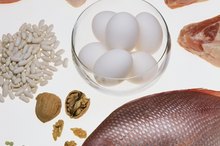High-Protein Low-Calorie Diet Plan
High protein diets which also contain low calories have the potential to serve as healthy eating plans for adults. When dietary guidelines for protein and caloric intake are adhered to, nutrient-rich protein sources are chosen, and health issues are taken into consideration this type of diet plan can result in a healthy lifestyle for people who strive to lose weight and stay well.
History
Protein is a nutrient that serves a critical role in the body. It is used to make up the structure of cells and functions as enzymes, transporters and hormones. The Institute of Medicine states that the Dietary Reference Intake (DRI) of protein is about 0.8 grams of protein per kilogram of body weight per day for adults. Therefore, necessary levels of protein vary for each individual and are based on body weight. In recent years, high-protein diets have gained popularity for their potential to promote weight loss. One study published in a 2004 issue of the "Journal of the American College of Nutrition" supported the protein intake of more than 1.5 grams per kilogram of body weight per day during weight loss. Findings also indicated that the increased intake of a high quality protein at breakfast may be important for weight loss on a high-protein diet.
Effects
USDA Recommendations of Protein in Diet
Learn More
Most high-protein diets result in a reduction in total caloric intake when lean sources of protein are chosen. This is because, when one switches from eating high-calorie and high-sugar processed foods to leaner protein sources, fewer calories are consumed and more nutrients are gained. When these lean protein sources are combined with fresh fruits and vegetables and whole grains, the result is a healthy diet that promotes weight loss. A study published in a 2005 issue of the "Journal of Clinical Nutrition" found that an energy-restricted, high-protein diet that was also low in fat had equal or greater nutritional and metabolic benefits as those seen with a high-carbohydrate diet.
Features
A high-protein, low-calorie diet plan can provide a healthy way of eating when smart food choices are made. This means choosing lean protein sources which also provide other sources of nutrients such as heart-healthy fatty acids and fiber. Some examples of these choices include grilled fatty fish such as salmon, as well as beans and lentils. Also, some grains such as quinoa offer a variety of essential amino acids. In addition to choosing quality protein for this type of diet, the level of calories should be monitored as well. The National Institutes of Health recommend that a healthy caloric intake for weight loss should not be below 1,200 calories per day for women or 1,500 calories per day for men unless medically supervised.
Warning
How Much Protein Is in a Filet of Flounder?
Learn More
High-protein diets might be safe for healthy adults, they could be dangerous for people with liver or kidney disease. Waste products generated during the metabolism of the added protein can be especially taxing to individuals with these conditions. For healthy people, high-protein diets are typically safe for short-term use. Long-term use, however, might limit the intake of other nutritionally beneficial foods.
Misconceptions
High-protein diets are often associated with improved athletic performance causing many athletes to turn to supplements for extra protein. The American College of Sports Medicine does support the protein intake of 1.2 to 1.7 grams per kilogram of body weight per day for endurance and strength in athletes, a figure higher than the DRI of 0.8 grams per kilogram. The organization, however, also states that this amount can most often be met through diet without the need for protein or amino acid supplements.
Related Articles
References
Resources
Writer Bio
Lori Rice is a freelance health and travel writer. As an avid traveler and former expat, she enjoys sharing her experiences and tips with other enthusiastic explorers. Rice received a master's degree in nutritional sciences and a bachelor’s degree in nutrition, fitness and health.









